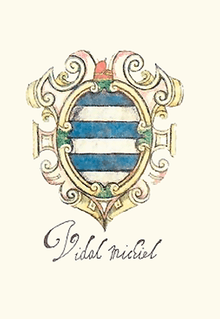Vitale I Michiel
Vital I Michiel (died 1102) was a Doge of Venice; he was the 33rd traditional (30th historic) Doge of the Republic of Venice. A member of one of the so-called “twelve apostolic” families, he was married to Felicia Cornaro, who had influence on his politics.[1]
Vitale I Michiel | |
|---|---|
 Coat of arms of Vitale I Michiel | |
| Doge of Venice | |
| In office 1095–1102 | |
| Personal details | |
| Born | Unknown |
| Died | 1102 |
Life
When Pope Urban II initiated the First Crusade, Vitale I Michiel did not initially urge Venice’s support, perhaps because he could not see the advantages to Venice of such an expedition.
The leader of the crusade, Godfrey of Bouillon (Goffredo di Buglione), along with his older brother, Eustace III of Boulogne, and younger brother Baldwin, left southern Italy in August 1096, with a contingent of 120 ships and (legendarily) 40,000 troops from all over Europe.
When Doge Vitale I Michiel saw the European commitment to the First Crusade, he then understood the war’s economic importance. In particular, he foresaw that it was vital to Venice’s trade advantage to participate in territorial conquest, lest these advantages inure to the benefit of other marine republics. In July 1099, 207 ships sailed from Venice to support the First Crusade. Doge Vitale I Michiel appointed his son, Vitale Giovanni, and the Bishop of Castello, Enrico Contarini, as the fleet’s commanders. In December 1099, at Rhodes, the Venetian fleet intercepted enemy ships and sank them.
In the spring of 1100, the Venetian fleet headed towards the Levant, where in the meantime, Godfrey of Bouillon and his troops had taken Jerusalem. Enemy ships had cut off Godfrey’s ability to receive aid and he was forced to negotiate with the Venetians. In exchange for its services, Venice obtained the right to maintain a quarter not subject to custom offices, taxes, or excise taxes in every conquered city or territory.
In 1101, Vitale I Michiele interceded in favor of Mathilde of Tuscany in regards to the purchase of Ferrara, and obtained generous trade concessions as a result. He died in the spring of 1102 and was buried at St. Mark’s Basilica.
References
| Political offices | ||
|---|---|---|
| Preceded by Vitale Faliero |
Doge of Venice 1095–1102 |
Succeeded by Ordelafo Faliero |